DO-IT News September 2017

Volume 25, Issue 4
Below are the articles of the DO-IT News September 2017 newsletter. These articles can also be seen all on one page at the Full Newsletter option.
2017 Trailblazer Award Winners
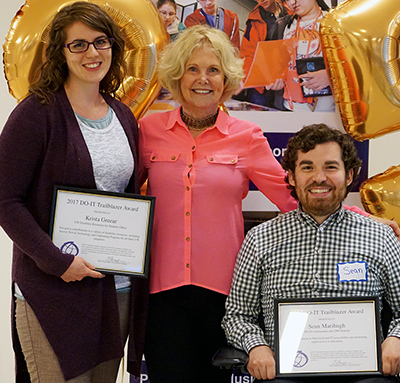
The DO‑IT Trailblazer award highlights DO‑IT community members who forge new pathways that will benefit others. Through their work and accomplishments they have changed the way the world views people with disabilities and have increased the potential of people with disabilities to succeed in college, careers, and community life. Congratulations to this year’s honorees!
Sean Marihugh, DO-IT Ambassador and ’09 Scholar, contributes to the accessibility of Microsoft products and arranges corporate visits for DO-IT Scholars and Ambassadors. Sean has presented about IT accessibility and equal access to education at national conferences and has been an active mentor in many DO-IT programs. He also volunteers as an accessibility instructor at DO-IT’s Summer Study. While an undergraduate student, Sean initiated and designed an interactive web page that lets students with disabilities track scholarships based on interests and types of disabilities. He also helped redesign the “Information Technology and Disabilities e-Journal” using the current accessible web development guidelines.
Krista Greear, of the University of Washington (UW) Disability Resources for Students office, goes above and beyond her regular duties. She has enthusiastically participated in DO-IT training videos, conference exhibits, and presentations. Krista manages the Access Text & Technology Program and Captioning Program for all three UW campuses. She is involved with the UW’s Web Council, the Approaches on Accessibility Interest Group, and the Online Advising Group. In her graduate work in Educational Technology, Krista aims to learn more about the tools, content, and strategies within online and hybrid courses in order to train faculty how to create accessible courses, degrees, and programs.
Sarah Wille is a senior researcher with Outlier Research and Evaluation at the University of Chicago and an AccessCSforAll partner. Sarah has worked to ensure that students with disabilities are included through her National Science Foundation funded grants related to computer science in K-12 education. The Computer Science & Students with Learning Differences study aims to expand participation in computer science by making computer science principles more accessible for students with learning disabilities and related attention disorders. As an active participant in several AccessCSforAll capacity building institutes and other meetings, Sarah has helped to advance the conversation on students with disabilities in K-12 education on a national level.
Leyf Starling, an Upper School faculty member at the Durham Academy, is an AccessEngineering partner. She has worked to ensure that students with disabilities have access to K-12 engineering education. As an active participant at AccessEngineering capacity building institutes, meetings, and other events, Leyf has recruited new participants to AccessEngineering efforts. In addition, Leyf has received AccessEngineering minigrants for Summer Engineering Experience for High School Students with Visual Impairments or Blindness and Inclusion of High School Students with Disabilities on FIRST (For Inspiration and Recognition of Science and Technology) Robotics Competition Team Activity.
Read more about DO-IT Trailblazers from past years online.
Making Your Presentation Accessible
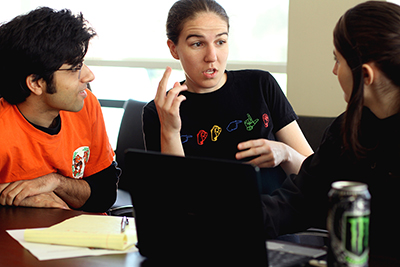
AccessComputing PI Richard Ladner and AccessComputing Partner Kyle Rector recently published an article in the Association for Computing Machinery’s Interactions on Making Your Presentation Accessible. Their advice can help to ensure that presentations are more accessible not only to individuals with disabilities but also those who may be attending a session remotely or who are not native English speakers.
Advice includes the following:
- Minimize the amount of text on slides to keep the focus on what you are saying. Pause to allow individuals a chance to read the slide and read it aloud so individuals who cannot see the presentation know what is on the slide.
- Minimize the number of visuals on slides. Describe images, graphs, and charts for individuals who are visually impaired.
- Use high contrast and take care with colors.
- Avoid or control the speed of animations so they can be described fully.
- Make sure that videos are captioned and audio described. Give a brief description of the video before it starts to help give context.
- Make sure the Q&A period is accessible. If there is a microphone for audience members, be sure they use it. Repeat questions that are asked.
Check out Kyle’s video Making Presentations Accessible for more information.
Summer Study: What Do Phase I Scholars Do?
DO‑IT Phase I Scholars participate in a two-week, live-in Summer Study session on the UW Seattle campus. They learn about college life; explore the Internet; interact with peers, staff, and mentors; and have fun. The DO‑IT Scholars program started in 1993 as an experimental project for teens with disabilities nationwide. It is currently open to Washington State teens and is supported by the State of Washington, the Boeing Company, the Microsoft Corporation, and the National Oceanic and Atmospheric Administration.
Microsoft Accessibility
At Microsoft we went to the Xbox accessibility room where we saw the innovative technology they were creating to expand Xbox’s player base. They showed us how 3D audio effects could be presented in a headset, as well as a vest, created for disc jockeys (DJs), but used by people with hearing impairments so they can feel the effects in a game that others would be able to hear. We also got to explore controllers that were smaller in size and lighter than normal for people who aren’t able to use the standard controllers.
We also saw new features added to the Xbox One to help people with visual impairments, such as audio description, magnification, and high contrast. Examples helped us understand these feature’s in action--one example was from a professional blind Killer Instinct player named Sightless Kombat who uses the sound options of the game to play competitively online.
Accessible Sports
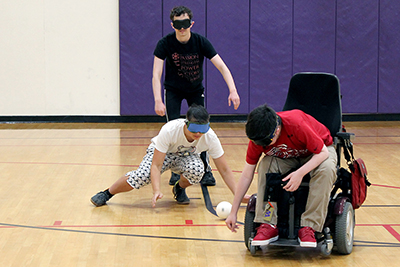
On Sunday we went to the Intermural Activities Building, a fitness center on the University of Washington campus. There we played a variety of accessible sports. The first sport we played was goalball, which is a sport for people with visual impairments. We put on blindfolds and were tasked with defending a goal from a heavy, jingling ball, by throwing ourselves out to block it. It was terrifying at first, but once we got the hang of it we started to have a lot of fun.
The second sport we played was beep baseball. Since the gym didn’t have all the equipment, people just rolled beeping balls at us while we were wearing the blindfolds. This activity was a lot like goalball, but the balls were a lot smaller and therefore much harder to grab as they were rolling towards us. We honestly couldn’t catch any of them without laying flat on the ground. Even though this sport was harder than goalball, it was still a fun and interesting experience.
In wheelchair basketball, the instructors showed us how to play basketball while using wheelchairs. We practiced dribbling the basketball, traveling with the ball, playing defense, and making baskets. At the end we played a scrimmage, with five people per team. It was interesting to learn a different way to play basketball.
We also played seated volleyball. At first we learned two different ways that you can hit the ball. Then we played a scrimmage game for the rest of the time. We learned that you have to slide around the court but cannot stand up, which was especially challenging.
University Village
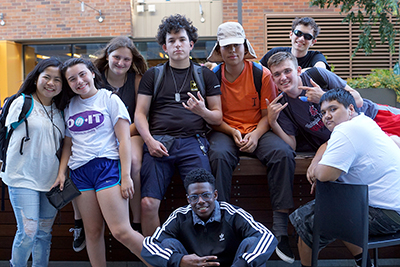
The trip to University Village (U Village) was a highlight of Summer Study. Not only did this experience give us an opportunity to get to know each other, but it also allowed us to talk about serious matters, such as our disabilities and our backgrounds.
U Village is an outdoor mall complex that is less than a mile from the University of Washington. From campus, there is a long steep hill, making it difficult for people with physical disabilities to get there. Fortunately, the DO-IT center provided transportation in vans for those who needed it. This is typical for DO-IT as they always strive to make it possible for disabled people to travel freely and participate in society.
When we got to U Village, we were split into groups. Our group went to the Microsoft Store, the Apple Store, the Seattle Team Store, the Nike Store, and Starbucks. During the visit to various stores we talked about many topics, including ourselves. Overall, the trip was a perfect gateway to create a community between the Scholars, enhancing our experience at the DO-IT Scholars program.
The Eventful First Night
It was a very peaceful first night at DO‑IT, until 2:00 a.m. I was sound asleep, as were most of the other Scholars. All of a sudden, I heard a blaring noise. Someone had set off the fire alarm. People were running around outside our dorm, trying to get organized. There were a lot of people knocking on doors, trying to get everyone out of the building. I couldn’t get out of bed because I use a chair to get around, so I had to lay there and endure the noise. This fire alarm made the most annoying sound I had ever heard. There was a regular alarm, then there was a worse higher‑pitched noise. My deaf roommate did not hear the alarm, so he was woken up by a bright light shining onto his face and a shaking bed. A few minutes after the alarm went off, a person came to the door and made sure everything was okay.
All in all, it was a very eventful first night at DO-IT, but it’s always good to keep people on their toes and be prepared for everything.
Pacific Science Center
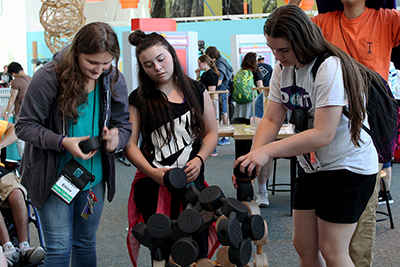
The first thing that we did after we entered the Pacific Science Center was visit the Boeing IMAX Theater. There was no problem entering the theater and there was plenty of accessible seating. We watched the movie Dream Big, which was based around engineering and showed us how all things come from simple ideas, and that any one of us could be the one who has the next big idea.
After watching the movie we had lunch outside and then were able to explore the rest of the museum. It is packed full of awesome exhibits on everything from space to dinosaurs.
The last thing we did at the Pacific Science Center was watch a Michael Jackson laser show. No one had any trouble accessing the laser dome or enjoying the show. It was awesome watching the show and listening to the music either reclined in a chair or lying on the floor. The show was a lot of fun and very relaxing. Visiting the Science Center was one of my favorite events during Summer Study.
Visiting Microsoft
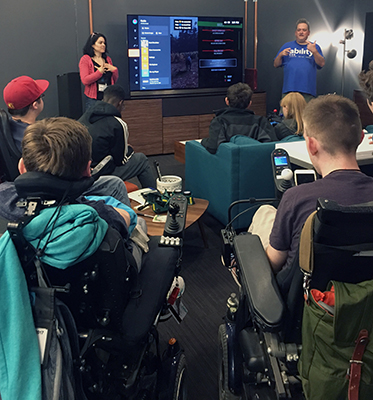
During the third full day of summer study, the Scholars took a trip to the Microsoft Headquarters in Redmond, WA. We began the day by brainstorming ideas about our ideal website design. Afterwards, four Microsoft employees with disabilities shared their experiences. Then things start to get really cool; we got to play with some adaptive technology for people with various disabilities.
The first piece of technology was named Seeing AI, an application for iOS devices. Seeing AI is a service that uses data from a photo and identifies the object(s) in that photo.
If a person is in the photo, the app attempts to identify their age, gender, and facial expression. However, the AI is relatively new and still learning—I used the application on myself and it identified me as a 30 year-old male so, they have some work to do.
The next piece of technology was a mobile arm attached to a sensor to allow someone to write with their sight. This is most useful for people who have ALS, are Quadriplegic, or have a disability that affects the use of their hands.
The last piece of technology introduced to us was the Hearing AI program. Hearing AI helps those who are deaf by describing sounds in the environment through graphic visualizations.
After looking at the adaptive technology, we moved to the experimental Xbox room. Here we saw a lot of upcoming modifications for controllers and accessibility features for people with sensory impairments.
One of the programs introduced was the Magnifier. This tool zooms in on anything that is currently on the screen, helping people with visual impairments. Another tool was called Narrator. Anything that is highlighted will be narrated so that blind people may hear what they are doing.
Overall the trip gave us a look at how Microsoft is making assistive technology for people to improve their quality of life. They are at the forefront of promoting a more inclusive world.
Phase II Projects
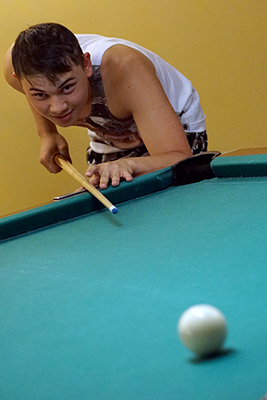
Every year the DO-IT Phase II Scholars present about themselves to the Phase I Scholars, other Phase II Scholars, Interns, and staff. During these presentations, you learn new things about the Phase II Scholars and the project they did throughout the school year. Phase II Scholars have a whole school year to work on their projects, and the presentations have to be less than five minutes long. These presentations also help you with your presentation skills.
This year, we learned many cool things about the Phase II Scholars. We learned from Adrian about Camp to Belong, a camp that reunites foster children with their siblings. We also learned about Takashi and his love for billiards. The projects and presentations can be about anything that interests each person.
Summer Study: What Do Phase II Scholars Do?
Phase II Scholars return to the UW Seattle campus for their second Summer Study. They meet the Phase I Scholars, learn about college life and career preparation, and participate in a one-week workshop with postsecondary instructors.
Neurobiology Workshop
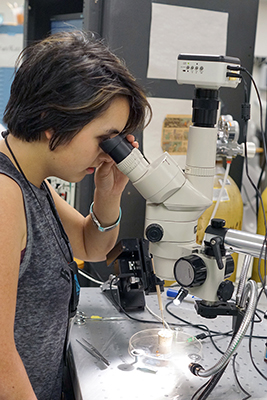
In the neurobiology Phase II workshop, the Scholars studied the reaction of embryonic mice hearts when drugs were used. Scholars also observed how the neurons from the cockroach leg responded when the Scholars pushed down on the leg hairs. The purposes of the experiments were to study the action potential of a neuron and how the nerves react when drugs are added to the system or when sensory nerves are activated.
During this workshop, the Scholars broke up into two groups. One group worked in the cockroach lab while the other worked in the embryonic mouse heart lab. In the cockroach lab, Scholars were able to analyze data recorded from manipulating the hairs on a cockroach leg. The cockroach legs were manipulated with a mechanical probe and viewed using a microscope. Data collected was analyzed to see how the neurons responded to touch. In the mouse heart lab, the Scholars focused on the reaction of the embryonic mouse heart when the two drugs nicotine and ACEA (Arachidonyl-2’-chloroethylamide) were applied. Scholars were able to witness how the heart reacted using a microscope and computer software.
The Phase II Scholars gained a lot of knowledge on working in a lab and conducting neurobiology experiments. Ryan enjoyed learning “more about the dissection process,” while they dissected the hearts from embryonic mice. Neurological pathways and the structure of neurons were the most important things learned by Cameron and Kyleelynn.
We appreciate Professor Marti Bosma and graduate students Aris, Chris, Comron, Josh, Kelly, Nikki, and Lauren for working with Scholars Cameron, Jayda, Kyleelynn, Naomi, Ryan, Teresa, and Z in this lab.
We would also like to thank Ron Killman for setting up the scopes, Dave Hurley and Mara Kilpatrick for helping in the biology study area, and Alex Hansen for helping with access.
Robotics Workshop
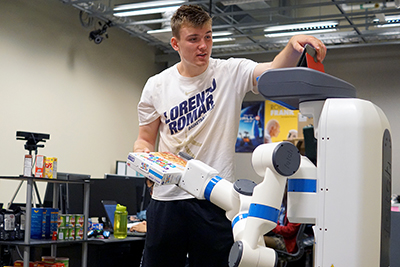
Do you like robots? Are you wondering what robots can do in the lives of people with disabilities? Well, you’re in luck because this article covers the DO-IT Phase II Robotics workshop at the University of Washington. Maya Cakmak is an assistant professor at the University of Washington, and was the lead staff for the robotics workshop. She teaches students how to program robots in order to help people with disabilities live independently. Justin Huang, a 5th year Ph.D student, also helps with this process.
The students in this workshop had to create a robot that helps people at the grocery store. The robot is designed to do a plethora of things including picking items off a shelf and offering different options to customers who were interested in a certain product. The Phase II Scholars had to do just that. We used Codeit, software used to program robots to do specific functions, to make the robot’s arm move and perform our desired tasks. With help from instructors and hands on learning from peers, the students designed a robot that showed how robots can be a benefit in our society.
Watch a video about the workshop online.
The Phase II Scholars who participated in the robotics workshop were Adrian, Rochelle, Serena, Micayla, Takashi, Jacky, and Jarrod.
New Grant on K-12 Computing Education for Students with Disabilities
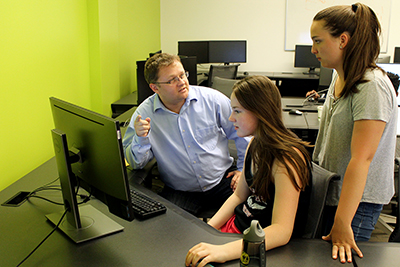
DO-IT has received a new National Science Foundation grant focused on K-12 computing education for students with disabilities. Through the grant, we will continue our AccessCSforAll work with Richard Ladner from the University of Washington Allen School of Computer Science and Engineering and Andreas Stefik from the University of Nevada Las Vegas.
K-12 students with disabilities in computing may encounter tools that are not accessible to screen readers or inaccessible curricula that relies exclusively on visual program output. The new grant will create a research practitioner partnership with schools that serve students who are deaf, blind, or have learning disabilities as well as mainstream schools to test the effectiveness of an accessible version of Advanced Placement Computer Science Principles. The project will also develop resources to help computer science teachers include students with disabilities in courses and partner with the College Board to ensure that they are ready to properly evaluate students with disabilities.
Interested in learning more about computing education for K-12 students? Check out our video Quorum: An Accessible Programming Language, which won a Facilitators’ Choice Award in the 2017 STEM for All Video Showcase. Read more about the work we’ve done so far in AccessCSforAll: Making Computer Science Accessible to K-12 Students in the United States in the June 2017 SIGACCESS Newsletter.
DO-IT Inducted into the Susan M. Daniels Mentoring Hall of Fame
DO-IT is among this year’s recipients of the prestigious Susan M. Daniels Mentoring Hall of Fame award. Granted by the National Disability Mentoring Coalition, the award recognizes outstanding leaders who mentor individuals with disabilities. DO-IT has long supported people with disabilities through mentoring, and was among the first in the world to implement internet-based mentoring for youth with disabilities.
The Hall of Fame award is named after longtime disability rights advocate Susan M. Daniels. Daniels spent much of her early life in rehabilitation settings due to complications from polio. She later went on to earn a Ph.D. in psychology. She was an active advocate for disability rights throughout her lifetime.
The award was featured on the “UW Information Technology Stories” website, which included the following comments from DO-IT director Sheryl Burgstahler: “We are honored to be inducted into the Hall of Fame. Individuals with disabilities make our communities more vibrant, diverse, and inclusive. We share this award with the mentors in our programs who serve as advocates, guides, and role models for others. In many ways, DO-IT’s success can be measured by the impressive accomplishments of DO-IT participants over the years.”
Ambassador Receives Disability Studies Program Award
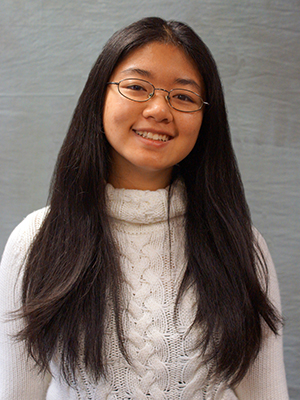
Last June, the disability studies program at the University of Washington (UW) presented the annual Disability Studies Awards. Jessie Zhang, a 2011 Scholar and Ambassador, was a recipient of the Dennis Lang Student Award.
The Dennis Lang Student Award was created to recognize “scholars, activists, and long-time student leaders in disability justice” at UW. The award’s namesake, Dennis Lang, is known as the guiding force that resulted in the UW disability studies program. Dennis’ experience as a person with a disability led to his passion for activism that resulted in the disability studies program we know today.
Jessie recently graduated from UW with a degree in informatics. During her time at UW she served as the president of the ASL (American Sign Language) Club and the director of the Student Disability Commission. Congratulations on your accomplishments, Jessie!
Read about the other 2017 Disability Studies Awards and their recipients online.
Advice From Scholars in College to Scholars About to Start
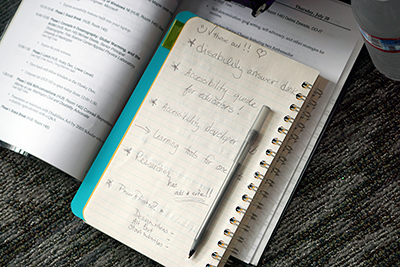
Tips and tricks college Scholars want you to know as you start your college experience.
“Join a club for something you really enjoy. Not only is joining a club a great way to meet friends who have similar interests as your own, it can also be a good resume booster—especially if you end up in a leadership position down the road. I’ve been a very active member of Harry Potter Club since my first week at college, and now, four years later, I’m the president. I’ve met most of my closest friends through the club. Plus, it gives me something to look forward to every Thursday night!” K, 2013 Scholar, University of Washington
“Attend events… the first few weeks of school to meet people and get more involved in school. There tends to be free food and gifts as well at those particular events. Always stay safe! Confide in a couple of people you trust, such as a good friend or an RA (resident advisor) and discuss how your disability affects you and what they can do to help in unexpected circumstances. For example, I have difficulty walking so I have a group of friends who always make sure I arrive home safely. I also have a surgical magnet worn within the ear, so I can’t receive MRIs (magnetic resonance imaging). My friends are available to let doctors and EMTs (emergency medical technicians) know of that particular situation.” Mikaela, 2014 Scholar, Washington State University
“Make sure to get a day planner and use it everyday. Also make sure you leave time to do homework everyday because you do not want to let it get stacked up. Be yourself at all times regardless of what others think, but make sure to realize people don’t magically grow up and mature during the summer between senior year and freshman year. Be prepared for another year of high school but on steroids.” Ryan, 2015 Scholar, Whitworth University
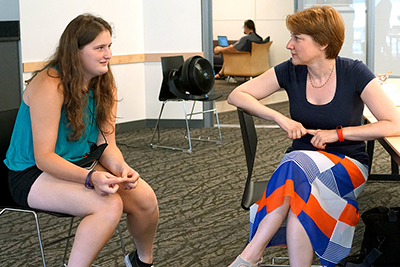
“See professors early for accommodations. College classes jump right into lectures, which makes it too easy to fall behind should you need something you don’t have! I would want to tell incoming freshman to email teachers before classes begin every quarter to talk about your specific needs. Every one of my instructors has been very accommodating and flexible with my needs once I get in touch!” Lindsey, 2014 Scholar, University of Washington
“Get as many available resources and opportunities as you can because you will never know what greater things will happen to you. In my freshmen year, I had a lot of resources such as getting help in certain classes and being able to talk to my advisors. Even though that I have plenty of time ahead to study before my future graduation, I realized that most of the resources and opportunities didn’t last as long as I expected, and I regret missing out on some experiences and the help I needed.” Jin, 2014 Scholar, University of Washington
“Go to your professors’ office hours! Do not be afraid to ask questions or get extra help. It will show your professor that you are eager to learn. Building a relationship with your professors can be very helpful. They are a good resource for internships, research opportunities, letters of recommendations, and even career advice.” Alicia, 2012 Scholar University of Washington
Universal Design in Higher Education: Promising Practices Call For Articles
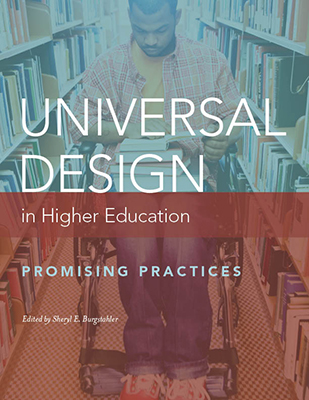
In DO-IT’s online publication, Universal Design in Higher Education: Promising Practices, practitioners share promising practices related to the application of universal design in postsecondary education settings. This collection of promising practices complements the more general content in the printed book, Universal Design in Higher Education: From Principles to Practice, which recently published a second edition under Harvard Education Press.
This complementary publication is available freely online. It can be freely copied and distributed as a book or in part for noncommercial, educational purposes. The collection will continue to grow as more articles are submitted.
Articles may be submitted at any time to udhecop@uw.edu. Submitted articles should include specific ways practitioners and researchers have applied universal design in postsecondary settings along with evidence of success. They are peer-reviewed by members of the Universal Design in Higher Education Community of Practice (udhecop@uw.edu), and if accepted, edited by DO‑IT. Articles selected for the online resource are freely available on our website. Authors must agree to these conditions while retaining copyrights to their individual contributions. For author guidelines, consult the preface of the book.
About DO-IT
DO-IT (Disabilities, Opportunities, Internetworking, and Technology) serves to increase the successful participation of individuals with disabilities in challenging academic programs and careers, such as those in science, engineering, mathematics, and technology. Primary funding for DO-IT is provided by the National Science Foundation, the State of Washington, and the U.S. Department of Education.
For further information, to be placed on the DO-IT mailing list, request this newsletter or other materials in an alternate format, or make comments or suggestions about DO-IT publications or web pages, contact us at
DO-IT
University of Washington
Box 354842
Seattle, WA 98195-4842
doit@uw.edu
www.uw.edu/doit/
206-685-DOIT (3648) (voice/TTY)
888-972-DOIT (3648) (toll free voice/TTY)
509-328-9331 (voice/TTY) Spokane
206-221-4171 (fax)
Founder and Director: Sheryl Burgstahler, Ph.D.
And stay updated on DO-IT activities by joining us on Facebook and Twitter!